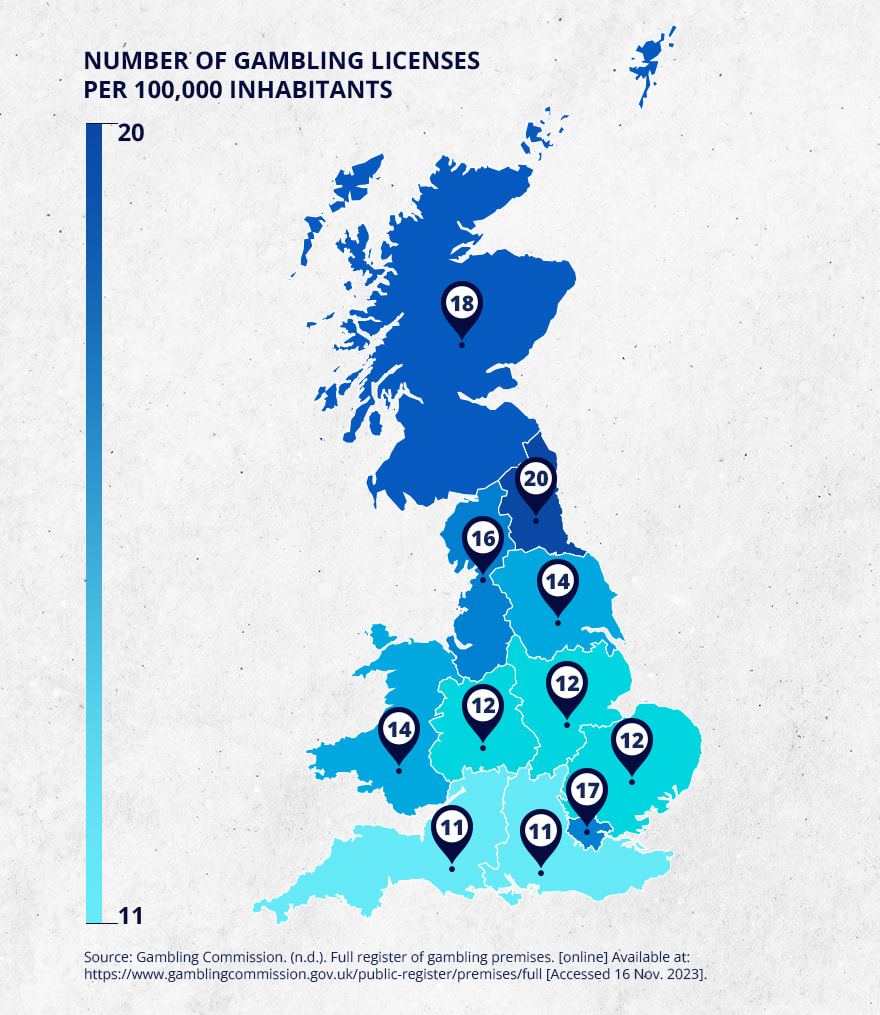A Tale of Two Britains: Exploring the North-South Divide in Gambling Licenses

The gambling landscape in the UK is complex, with stark regional variations in license rates that highlight intriguing cultural divides across the nation. Data from the Gambling Commission reveals that the number of gambling licenses per 100,000 people [1] is markedly higher in northern regions compared to the south.
Interestingly, income does not seem to be a driving factor, which could point to gambling being more culturally ingrained in the North, compared to the more reserved South where it holds less sway in public life. However, the rise of online gambling complicates matters, as it transcends geography and may require rethinking place-based policy approaches. Tailored regulations are still needed but should consider both the digital world and diverse physical landscapes.
Map of UK Gambling Licenses by Region

| Region | Number of licenses per 100000 inhabitants |
|---|---|
| South West | 11 |
| South East | 11 |
| East Midlands | 12 |
| West Midlands | 12 |
| East of England | 12 |
| Yorkshire and Humber | 14 |
| Wales | 14 |
| North West England | 16 |
| Greater London | 17 |
| Scotland | 18 |
| North East England | 20 |
Analysing the Licensing Data
The data tells an interesting story. The North East has the highest rate at 20 licenses per 100,000 inhabitants, followed by the North West (16 licenses) and Scotland (18 licenses). Meanwhile the South East (11 licenses), South West (11 licenses) and East of England (12 licenses) lag behind. Greater London not a wholly surprising outlier, with 17 licenses per 100,000, putting it above other Southern regions. The likely reason for this is that it is the economic heart of the UK, with much more diverse cultural and entertainment offerings than other areas.
This distribution is visualized in the map, with darker shades of red indicating more licenses proportional to population. A clear North-South divide emerges, with the exception of London in the South East.
While the raw figures reveal variances in gambling prevalence, comparing this data to economic factors paints a more nuanced picture. There is little correlation between income and license rates [2,3]. Despite boasting the highest median salaries and GDP, Greater London possesses an average number of licenses. The North East conversely has the lowest earnings and GDP, yet the highest license rate.
Exploring Cultural Explanations
Why is gambling so much more prevalent in northern regions when wealth is concentrated in the South? One hypothesis is that it forms a more integral part of social life and cultural identity there. Northern regions have a strong social heritage rooted in close-knit working-class communities centered around pubs, betting shops, and bingo halls as social hubs.
Compared to the more individualistic and private culture in the South, social attitudes in the North may view gambling as a more normalized pastime rather than a taboo vice. This intertwining with Northern social identity could explain the higher prevalence. The North’s communal values and attitudes may contribute to the popularity of gambling as both an entertainment activity and a community-building tool.
London and the South are characterized by white-collar professional services and greater affluence. A more reserved culture where gambling lacks the same social clout has perhaps limited its growth. The South’s suburban geography of dispersed populations in smaller settlements rather than dense urban centers may have also contributed.
This suggests a tale of two Britains divided along cultural fault lines. Just as Northerners stereotypically view Southerners as reserved and uptight, could it be a more fun-loving and easy-going attitude that’s responsible? This could shed light on gambling being more woven into the social fabric of daily life up North more so than down South.
Of course, these are broad generalizations that require deeper investigation. Without extensive surveys and qualitative data, we cannot make conclusive judgments. But the figures may suggest intriguing cultural differences that merit further exploration through rigorous social research.
The Digital Dimension: The Rise of Online Gambling
Exclusively focusing on physical gambling locations misses a crucial factor – the rise of online gambling. Virtual casinos transcend geography, with players readily accessing sites from laptops and mobiles without visiting venues.
In 2020, almost one in four Brits gambled online at least once every four weeks [4]. This disrupts traditional spatial patterns. Someone in rural Cumbria can play at the best slot sites as easily as a Londoner with no need to frequent brick-and-mortar bookmakers.
With online gambling more evenly spread nationally, a growing spatial disconnect emerges between where players live and where gambling ‘happens’. Tighter Northern license controls may push more people online, where oversight is trickier. Overly lax Southern restrictions equally risk a spike in digital gambling there.
Policymakers must incorporate this digital dimension into regulations. Balancing online freedoms and protections cannot rely solely on physical location. Holistic, platform-neutral approaches are needed as gambling goes virtual.
Rethinking Regulation in a Digital Age
These trends pose challenges for policymakers. Can place-based policies sufficiently address gambling when the online world defies geography?
With gambling impacting more physical communities up North, targeted Northern regulations seem apt. But stricter controls could simply shift activity online and out of view. Here, national digital policies could be more effective for providing consistent oversight.
Conversely, looser Southern restrictions could allow a rapid online gambling uptick despite low physical venue presence. But this may prompt calls for tighter digital controls everywhere.
The growth of online gambling means physical location alone cannot drive policy. National digital frameworks, cooperating with local place-based measures, may better calibrate freedoms and protections in the internet age. Our thinking must grow beyond physical places to encompass digital spaces.
Looking Ahead
Reconciling freedom and responsibility around gambling is no easy feat. But we must avoid knee-jerk policies that gloss over complexities.
Gambling triggers fierce debates around individual liberties versus regulation. But discussions should be reasoned and evidence-based, not reactionary. Stereotypes around regional identities do little to progress policy or bridge divides.
With gambling intersecting more British lives, particularly up North, its cultural footprint warrants measured but serious attention. If ideologically-charged rhetoric replaces nuanced scrutiny, we are all losers in this high-stakes game.
Responsible licensing and regulation grounded in research is key. But this must evolve beyond physical places to address the borderless digital world. Only by incorporating both dimensions can policymakers and the public work towards solutions fit for the 21st century. The stakes are undoubtedly high, but the opportunity for progress is greater still.
References:
- [1] https://www.gamblingcommission.gov.uk/public-register/premises/full
- [2] https://www.statista.com/statistics/416139/full-time-annual-salary-in-the-uk-by-region/
- [3] https://www.statista.com/statistics/1004135/uk-gdp-by-region/
- [4] https://www.gamblingcommission.gov.uk/statistics-and-research/consumer-gambling-behaviour/series/behaviour-awareness-and-attitudes


